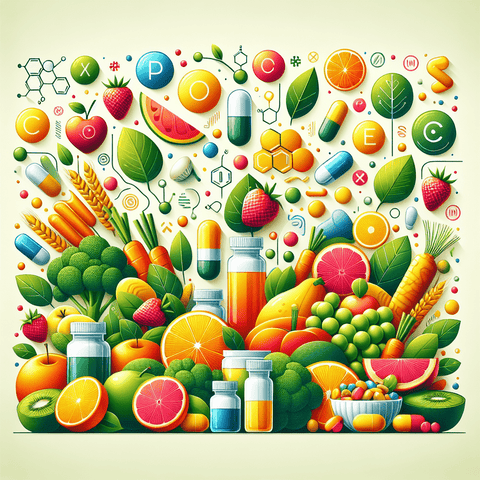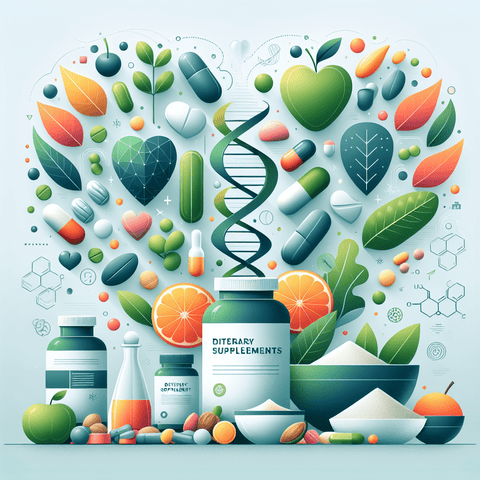Introduction
In a world where food choices, lifestyle habits, and environmental conditions vary significantly, maintaining optimal health through a balanced diet alone can be challenging. While a diet rich in whole foods is ideal, the reality is that most people miss out on essential micronutrients needed for everyday functioning. Among these, vitamins are fundamental in supporting immune response, energy levels, brain health, and more. Naturally, the question arises: Which vitamin should be taken daily? This blog post explores the top essential vitamins to consider for daily supplementation, supported by scientific evidence and practical daily health applications. We'll cover Vitamin C, Vitamin D, Vitamin B12, Vitamin A, Vitamin E, and Zinc—highlighting their role, natural sources, deficiency symptoms, safe intake levels, and how supplements can fill any nutritional gaps.
Understanding the Role of Vitamin C in Nutritional Supplements
Vitamin C, also known as ascorbic acid, is one of the most commonly known and taken supplements worldwide. As a water-soluble vitamin, the body doesn't store it, meaning regular intake is vital. Vitamin C plays a fundamental role in immune defense, skin health, antioxidant protection, and iron absorption.
Function in the body: Vitamin C is a potent antioxidant that helps neutralize free radicals, thereby reducing oxidative stress that can lead to chronic illness. It is critical for collagen synthesis, supporting wound healing, gums, and skin elasticity. Moreover, it enhances the functionality of white blood cells, the warriors of your immune system.
Sources: This vitamin is abundantly available in fruits and vegetables like oranges, strawberries, bell peppers, kiwi, and broccoli. However, dietary intake might not meet the required daily allowance for certain populations, including smokers, individuals under stress, and those with a limited variety in their diet.
Recommended daily intake: For adults, the Recommended Dietary Allowance (RDA) is approximately 75 mg for women and 90 mg for men. Some experts suggest higher doses in certain cases, especially during cold and flu seasons for immune support, provided they comply with established safety guidelines.
Signs of deficiency: Early warning signs may include fatigue, gum inflammation, joint pain, and frequent infections. In extreme cases, a deficiency can lead to scurvy, though it is rare in developed nations.
Scientific backing: Research has shown that while Vitamin C may not prevent the common cold, consistent daily use may reduce its severity and duration. Its antioxidant properties also play a role in slowing down skin aging and improving overall wellness in tissue repair and maintenance.
Supplementation: Daily Vitamin C supplements can be particularly helpful for people with increased oxidative stress or limited intake through diet. For individuals looking to support their immune function effectively, consider exploring Vitamin C supplements that align with your lifestyle and dietary needs.
When taken as part of a balanced routine, Vitamin C supplementation covers several essential aspects of health, making it an excellent candidate for daily intake.
Essential Nutrient: The Importance of Vitamin D for Overall Well-being
Vitamin D, often referred to as the "sunshine vitamin," plays a pivotal role in regulating calcium and phosphate in the body—nutrients critical for maintaining bone, teeth, and immune health. Unlike other vitamins, Vitamin D is synthesized in the skin through exposure to UVB rays from sunlight, but factors like season, latitude, skin tone, sunscreen use, and age can influence its production.
Functions in the body: Vitamin D contributes significantly to bone health, aiding calcium absorption in the gut. In addition, it plays roles in immune modulation, neuromuscular function, and inflammation reduction. Emerging science also highlights its involvement in maintaining psychological well-being and mental health resilience.
Sources: While sun exposure is the main natural source, dietary inputs like fatty fish, beef liver, cheese, and fortified foods can also provide this nutrient. However, few foods naturally supply high quantities of Vitamin D.
Recommended daily intake: According to many health organizations, the recommended daily value ranges between 600–800 IU (15–20 µg), though higher amounts may be advised for individuals with existing deficiencies or limited sun exposure. Individuals over 70 years may require up to 800–1000 IU per day.
Risks of deficiency: Vitamin D deficiency is widespread, affecting various populations regardless of geographical location. Symptoms include bone pain, muscle weakness, and increased susceptibility to infection. Risk groups include the elderly, individuals with darker skin, and those who spend significant time indoors.
Evidence and supplementation: Scientific reviews have linked adequate Vitamin D levels to reduced rates of bone fractures, improved muscle strength in older adults, enhanced immune function, and improved mood. These benefits make it a strong candidate for regular supplementation, especially in seasons or regions with low sunlight.
For ongoing support, consider integrating high-quality Vitamin D supplements into your routine, particularly tailored to your age, lifestyle, and regional exposure to sunlight. Choosing a supplement with both Vitamin D3 and K2 may further enhance calcium metabolism and bone health synergy.
Daily Supplement: The Case for Vitamin B12 in Maintaining Energy and Brain Function
Vitamin B12, or cobalamin, is a water-soluble vitamin essential for DNA synthesis, red blood cell production, brain function, and nervous system integrity. Unlike some other vitamins, B12 is unique due to its complex absorption mechanism and the essential role it plays in metabolic energy production.
Absorption challenges: B12 requires a protein called intrinsic factor in the stomach for proper absorption. This becomes concerning for certain people: older adults, those with gastrointestinal disorders (such as Crohn's or celiac disease), and individuals who have undergone certain surgeries. Moreover, vegans and vegetarians are also at risk due to limited plant-based sources of B12.
Deficiency signs: Common symptoms include fatigue, memory lapses, tingling in the extremities (peripheral neuropathy), depression, anemia, and cognitive decline. Over time, if left untreated, a deficiency can result in irreversible neurological damage.
Benefits of supplementation: Daily Vitamin B12 supplementation can offer multiple benefits including improved cognitive performance, better mood regulation, higher energy levels, and enhanced metabolism. Supplementation is often necessary for those who can't obtain sufficient amounts from food, particularly vegetarians and vegans.
Forms and dosages: B12 supplements are available in several forms, including cyanocobalamin and methylcobalamin—the latter being the active, bio-available form. Most multivitamins contain around 2.4 mcg of B12, aligning with adult RDA, though higher doses (up to 500 mcg) may be recommended under monitored conditions.
Incorporating daily B12 not only boosts energy and mood but also guards against long-term neural complications. Pairing this nutrient with a well-structured diet and appropriate lifestyle practices ensures coverage for this critical coenzyme role.
Vitamin Deficiency: Identifying and Preventing Vitamin A Deficiency through Daily Intake
Vitamin A is a fat-soluble vitamin vital for vision, immune response, reproduction, and cellular communication. It exists in two forms: preformed Vitamin A (retinol), found in animal products, and provitamin A (beta-carotene), found in plant-based foods.
Functions in the body: Vitamin A supports the maintenance of epithelial tissues, regulates gene expression, and forms the pigments required for vision. It also plays a central role in strengthening the body's immune defenses, particularly mucosal immunity.
Deficiency symptoms: Among the earliest symptoms of deficiency is night blindness. Other signs include dry skin, frequent infections, and impaired wound healing. Children and pregnant women are more vulnerable to Vitamin A inadequacies.
Dietary sources and risks: While liver, dairy products, and fish are rich in retinol, beta-carotene is found in carrots, sweet potatoes, and dark leafy greens. Depending solely on diet might not suffice for everyone, especially in low-resource settings or among those with fat-malabsorption disorders.
Balancing dosage: The recommended intake is around 700–900 mcg of retinol activity equivalents (RAE) for adults. High-dose supplements should be taken cautiously due to potential toxicity. The Upper Intake Level (UL) sits at 3,000 mcg/day.
Prevention through supplementation: Scientific reviews show that Vitamin A supplementation plays a crucial role in reducing child mortality rates in developing nations, largely by lowering susceptibility to infections. For adults, targeted supplements may improve skin and eye health and fortify the immune system.
Incorporating Vitamin A into a daily nutritional routine offers preventive protection against visual decline and immune vulnerability. Choosing formulations from trusted sources helps ensure you're getting safe, effective dosages aligned with your health profile.
Health Benefits: Exploring the Wide-Ranging Advantages of Consistent Vitamin E Intake
Vitamin E is a fat-soluble antioxidant that protects cells from oxidative damage, supports skin and eye health, and contributes to a healthy cardiovascular system. It includes eight compounds, but alpha-tocopherol is the most active form in humans.
Mechanism of action: Vitamin E serves as a shield against free radicals that damage cellular structures. It is especially vital for maintaining the integrity of skin, heart muscle, and eye cells. Beyond its antioxidant function, Vitamin E also supports immune system regulation and inflammation management.
Sources: Dietary intakes include nuts, seeds, spinach, and vegetable oils. However, intensive food processing often strips food of this nutrient. The typical western diet frequently falls short of meeting daily Vitamin E requirements, necessitating supplementation.
Dosage and demographics: The RDA for adults is approximately 15 mg (22.4 IU) per day. Individuals over 65, smokers, and athletes may benefit from higher intake levels due to increased oxidative stress or metabolic demand.
Scientific benefits: Studies indicate that optimal Vitamin E levels may support reduced oxidative biomarker levels, improved skin hydration, and ocular protection. However, supplementation should remain within recommended dosages to avoid any potential anticoagulant effects at high doses.
Supplementation: For those seeking a consistent antioxidant strategy, daily Vitamin E supplements offer broad protective benefits. Many formulations also combine with complementary compounds like selenium or CoQ10 for enhanced cellular defense.
Daily intake of Vitamin E is essential not just for physical wellness but also for ethical aging and cellular longevity. It represents a practical addition to any health-conscious individual's routine.
Immune Support: The Critical Role of Zinc as a Daily Nutrient to Boost Immunity
While not technically a vitamin, Zinc is a trace element critical in cellular growth, immune response, wound healing, and hormone regulation, making it a key player alongside daily vitamins. Zinc acts as a coenzyme in over 300 enzymatic reactions within the human body, making it indispensable for metabolic functioning.
Immune benefits: Zinc's immune-modulating role supports both the innate and adaptive immune systems. It enhances the barrier function of epithelial cells and plays a part in the proliferation of lymphocytes. This makes Zinc a popular choice during cold and flu season.
Deficiency concerns: Zinc deficiency is most common in vegetarians, pregnant and breastfeeding women, and individuals with gastrointestinal conditions. Symptoms include slower wound healing, weakened senses of smell or taste, and frequent infections.
Recommended intake: Men need approximately 11 mg/day and women 8 mg/day. Safe upper tolerable levels hover around 40 mg/day, above which side effects like nausea and immune suppression may occur.
Scientific support: Studies show that daily supplementation with Zinc can reduce the duration and severity of common colds, alongside improving immune resilience in those with recurrent infections.
Supplementation strategy: Zinc forms such as gluconate, citrate, or picolinate are commonly used and well-tolerated. By incorporating balanced Zinc supplementation, particularly when combined with a robust multivitamin, one can establish a solid foundation for immune strength.
For an all-around immune-supportive approach, Zinc should feature as part of any complete supplement regimen. When paired with Vitamin C or D, synergies amplify their immune-modulatory effects and overall wellness impacts.
Conclusion
While no single vitamin can act as a magic bullet for good health, a strategic blend of essential micronutrients taken consistently each day can greatly improve one's energy, immunity, and long-term wellness. Vitamins C, D, B12, A, E, and the mineral Zinc are among the most beneficial to prioritize daily, based on scientific evidence and modern lifestyle demands. Everyone’s nutritional needs vary, so it’s always wise to consult healthcare professionals before starting any supplementation.
To support holistic health, choose safe and effective formulations from verified sources. Explore high-quality supplement collections at Topvitamine.com and build your personalized daily nutrient strategy today.
Q&A Section
Q: Which vitamins are best taken daily?
A: Vitamins C, D, B12, A, and E, along with Zinc, are essential candidates for daily supplementation, depending on individual health status and dietary intake.
Q: What vitamin boosts energy the most?
A: Vitamin B12 is most directly linked to enhanced energy levels due to its role in red blood cell formation and neurological function.
Q: Is it safe to take multiple vitamins each day?
A: Yes, but ensure you're not exceeding the safe upper intake levels. Consider a tailored multivitamin or consult a health professional to avoid any interactions or overdoses.
Q: What happens if I miss a day of taking vitamins?
A: Missing a single day isn't usually harmful. However, consistent daily use ensures optimal nutrient stores and physiological benefits over time.
Q: Can I replace a poor diet with supplements?
A: No. Supplements fill nutritional gaps but should complement, not replace, a balanced diet. Whole foods offer synergistic compounds that supplements alone can't replicate.
Important Keywords
- Vitamin C daily supplement
- Vitamin D for bone and mood
- Vitamin B12 energy levels
- Vitamin A deficiency prevention
- Vitamin E for skin and antioxidants
- Zinc immune support
- Best vitamins to take daily
- Nutritional supplement routine
- Daily multivitamin benefits
- Top vitamins for wellness



